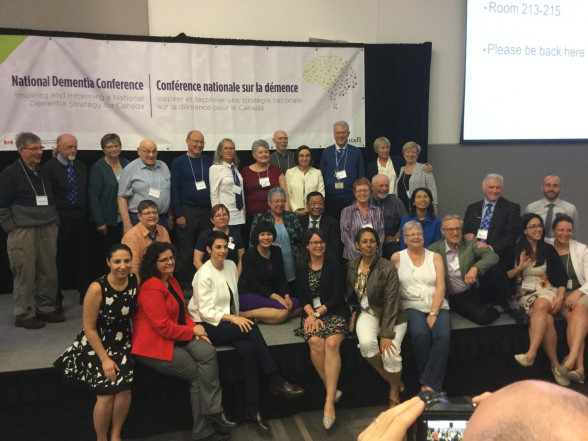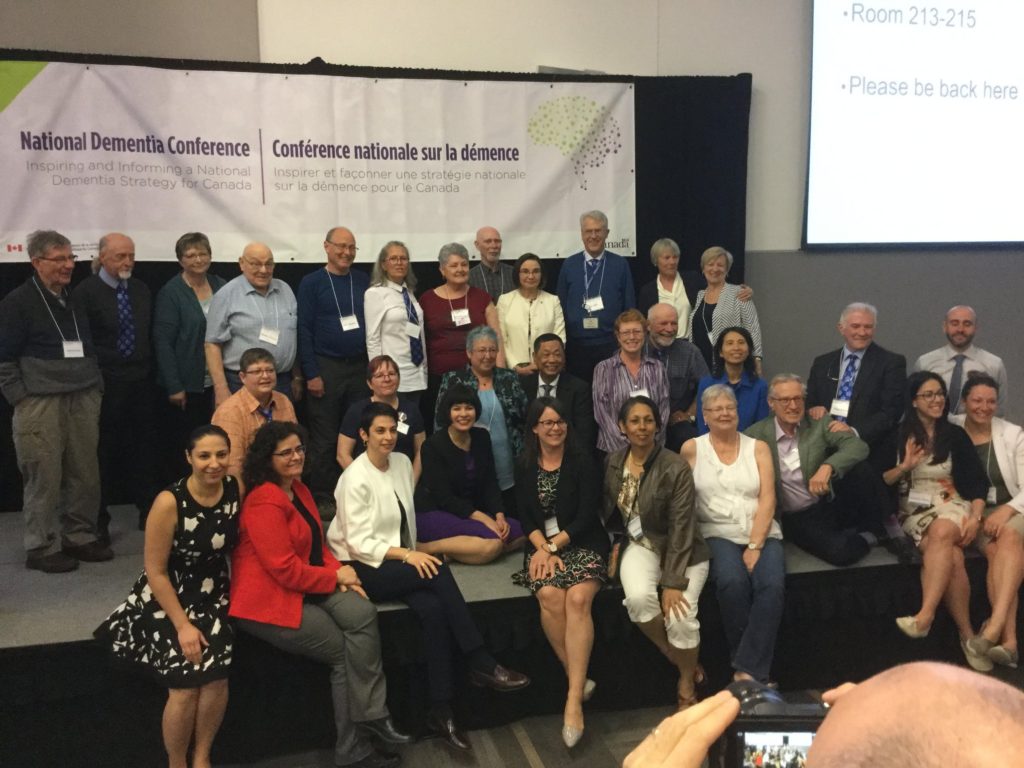On May 14-15, 2018, a great number of DAI members, and others with dementia attended the National Dementia Conference, hosted by the Canadian Government. I was privileged to be invited and to give a short speech, and was honoured to be on the same program as Mary-Beth Wighton and Phyllis Fehr. Their speeches will follow in another blog very soon.
One of the highlights for me was meeting so many of my 'online' friends in person, and many of us said goodbye with joy, and tears.
The photo above is of the conference delegates living with dementia, and the government officials and staff who organised it, including the Canadian Minister of Health, Ginette Petitpas Taylor, MP, who attended on both days.
She is also attending the World health Assembly in Geneva this week (we met in the corridors of the UN), so who knows, I may have an update or even a 'selfie' to post here!!!
We are extremely proud to announce here that Mary Beth Wighton, one of the founders of the Ontario Dementia Advocacy Group (ODAG), and current Chair was selected, along with Jim Mann, to be full members of the Ministerial Dementia Advisory Group.
Both are members of DAI as well. We have no doubt they will influence the national plan and if necessary, forcefully ensure it is embedded with rights for all. We congratulate them both, and all people living with dementia in Canada for their passion and drive.
Clearly, the most important elements of any National or Local Dementia Strategy or Plan are our basic human rights.
- Human rights
- Disability rights
- Access to a timely diagnosis
- Access to care and support that promotes independence
- A new post diagnositic care pathway or 'model of care' that is a blend of health care and disAbility support
- Rehabilitation assessment and support, at the time of diagnosis, for all people with dementia, including speech pathology
- Disability assessment and support at the time of diagnosis
- Access to education and care for our families and care partners
- Education for everyone working in or impacted by dementia
- Moving away from any form of chemical or physical restraint
- National Risk reduction strategies
For me, this includes full support for all people with dementia to attend (any event or conference) financially, to ensure full and equal inclusion and participation, as well as full support for our cognitive and disabilities. This is a legal right, not just a human right.
The following are my speech notes and as my 'brief' was rather limiting, I decided to broaden the elements of my speech:
Slide 1: People with deMEntia in Research Ethical Considerations
Thank you for the invitation to join this conference, and the panel today.
Slide 2: Global Overview of deMEntia
- 50 million people living with dementia
- 1 new diagnosis every 3 seconds
- The cost of dementia is estimated to be 818 billion dollars
- The majority of care is provided by unpaid family care partners
- Dementia is the 7thleading cause of death globally
- In Australia, it is now the leading cause of death in women, and the 2ndleading cause of death of all diseases
- Dementia disproportionately effects women, in terms of the numbers diagnosed, and the number of unpaid family care partners
- Stigma, discrimination, the deeply entrenched myths about people with dementia, and the
Overview of DAI, which was launched on January 1, 2014 by 8 people with dementia, including one from Canada:
- Membership now spans 47 countries
- The services and support available to members and the broader dementia community is provided free for members, and on an annual budget of less than $50,000 USD – for the first 18 months, DAI was completely self funded
- We still self fund much of our human rights and global work, including supporting countries with their national dementia plans, such as my trip to Canada
- Global impact on the WHO Global Dementia Action Plan, human rights and dementia being seen and treated as a disability – before we started advocating, there was little more than rhetoric about rights
- DAI provides significant information and support to members within their own country Dementia Advisory Groups, such as the Ontario Dementia Advisory Group
- Our members now need Alzheimer’s Associations and other organisations to partner with us, as Alzheimer’s Disease International has, to complement the services and support they provide
Slide 3: Living with deMEntia
When I was diagnosed in 2008 at the age of 49, the advice I was given was to go home, give up work, give up study, get my end of life affairs in order, and to get acquainted with aged care
The challenges of a diagnosis of deMEntia in 2018 are much the same! Most new members of DAI and others I meet with dementia around the world tell me nothing has changed. Both Mary-Beth and Phyllis have told us this was true for them as well.
Human rights and deMEntia
- It is a breach of our most basic human rights not to be supported to live as positively as possible with dementia
- It is no different our care partners and families receive little or no support
- It is a breach of our human rights not to be provided with post diagnostic support that includes rehabilitation, including speech pathology when we are first diagnosed for speech and language impairments, not at the end of life when we can’t swallow and are almost ready to die
- The WHO states dementia is the leading cause of death and disability in older people – yet so far, service providers and health care professionals do not actively support our disabilities with strategies to maintain independence for as long as possible
- As a mature age student at a university when diagnosed, I was proactively supported to keep living my life, with proactive disability support, as my children would have been if they were living with any type of disability
- It is imperative there is nothing about us, without us; including in research
I trademarked what happened to me 10 years ago as Prescribed Disengagement®. Unfortunately, I have hundreds of examples of anecdotal evidence this is still happening to the majority of people after diagnosis today.
It is a human rights issue that must be addressed in all national dementia plans and strategies, in the provision of health care, and in policies and services. I was the first person with dementia to speak as an invited keynote speaker at the WHO, which is a specialised agency of the United Nations in March 2015. Since then, much has happened, including the unanimous adoption of the WHO Global Dementia Action Plan: A Public Health response to dementia 2017-2015. The only truly accountable section of this Global Dementia Action Plan, adopted at the WHA in May 2017 are the cross cutting principles. I personally believe Taiwan has led the way; Canada could be next, if you get it right now.
Redefining responses to deMEntia
- Janssen Pharmaceutical developed the term BPSD, and funded the first guidelines; they invested a lot of time and money promoting this through clinicians and researchers
- This paradigm has likely caused worse care, ensure we do not provide person centred care, and resulted in chemical and restraints being used to manage the responses to dementia or responses to poor care that people with dementia express
Slide 4: Human Rights, Research & deMEntia
Ethical considerations of involving people with deMEntia in research clearly include causing no harm to research participants. Historically, research was done about us, through our care partners, unless it was pure scientific research for a cure or a disease-modifying drug. It is still very difficult to get ethics approvals when including people with dementia I research, which I know from personal experience as a ‘young’ researcher.
For example, in an Annual Report on stigma published in 2012, only 7% of people with dementia were included in the research participant cohort – the rest were families, hence this report does not report on the stigma we feel, but what other believe we experience, which is significantly biased by their own suffering.
Managing the gate-keepers continues t be a challenge, as the paternalistic views about us, and the subconscious beliefs and attitudes about us not having capacity or sufficient cognitive ability to be involved in society, let alone in research, is endemic. Even today, most decisions made for or about us, are deeply influenced by people without dementia. In my role as the Chair and CEO of Dementia Alliance International, I can tell yo we receive on average, 5 requests per week from researchers to engage with our members, as they cannot get either the family members to agree to involve us, or the advocacy organisations to share the opportunities for participatory research.
The wellbeing of research participants with deMEntia should be important to everyone, and especially if a trial ends or fails, no care is provided post trial for the research participants. DAI members report that when a trial is either stopped, or comes to an end, they are ‘dropped like hot pancakes’. This is unethical, and could be seen as a human rights issue as well.
People become involved in trials, not only in the hope of finding a cure for themselves, but for future generations. Research for a cure, but even more so for better care, and for risk reduction or slowing the progression of dementia are of great interest to most people currently diagnosed. We need to be supported emotional, physically and financially to be involved in research, and we need research opportunities made publicly available to us. We also need pharmaceutical companies and the media to stop selling false hope!
Involving people with deMEntia in National Dementia Plans and Strategies
Finally, in everything you do, I implore you to SEE THE PERSON, NOT ONLY THE DEMENTIA. We are human beings, with a condition causing changing capacity and functional disabilities.
Given the right support, and equal opportunities to all other persons with an acquired disability, we have a lot to contribute, not only to research, but also to society as a whole.
Thank you.
Kate Swaffer, DAI Chair, CEO & Co-founder
My slides can be downloaded here: Kate Swaffer_National Dementia Conference_Canada_May_2018

